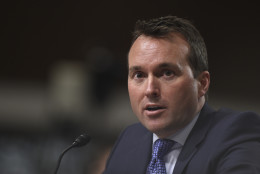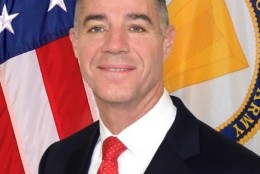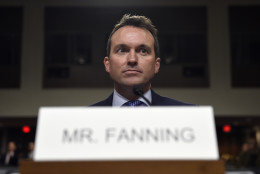Hubbard Radio Washington DC, LLC. All rights reserved. This website is not intended for users located within the European Economic Area.
Eric Fanning
-
Eric Fanning, the secretary of the Army, said last week that he's ordered a new initiative designed to reduce time-consuming requirements directed by Department of the Army headquarters, particularly with regard to training.
October 10, 2016 -
The Army is taking a hard look at its childcare and expects a report by the end of the month.
October 06, 2016 -
The Army's new Rapid Capabilities Office is taking it's name to heart and issuing a charter next month.
October 04, 2016 -
The Army is changing and with it are the demands on its individual soldiers. Army Chief of Staff Gen. Mark Milley explained what characteristics the next generation soldier will hold.
October 03, 2016 -
The Army is reexamining the cases of at least 73 soldiers who it kicked out under other-than-honorable circumstances between 2009 and 2015 because it may have run afoul of a federal law intended to help ensure troops aren’t punished for mental health issues.
September 19, 2016 -
The Army is starting is Rapid Capabilities Office in hopes to speed up acquisitions of top priorities.
August 31, 2016 -
The Army has 100,000 non-deployable troops, mostly due to medical reasons, Vice Army Chief of Staff Gen. Daniel Allyn says only 10,000 will be eligible to fight again.
June 13, 2016 -
The Army is tightening retention policy, which will lead to 3,000 noncommissioned officers leaving the service. A new directive returns retention control points to their pre-2007 levels. The soldiers are forced to retire or go to the reserve or National Guard components.
June 02, 2016 -
During a confirmation hearing Eric Fanning said the Army needs a Rapid Capabilities Office and is lagging in readiness.
January 21, 2016 -
Undersecretary of the Army Eric Fanning has been nominated by the president to serve as Army Secretary.
September 18, 2015 -
Defense Secretary Ashton Carter announced Thursday that he’s appointed Eric Fanning to be the Army’s number-two civilian, at least in an acting capacity.
July 06, 2015 -
Air Force leaders intend to surpass their share of Defense Secretary Chuck Hagel's edict to reduce DoD headquarters spending by 20 percent and complete the task several years ahead of schedule. The personnel cuts are part of the service's plan to shrink its size in order to catch up with decades of deferred spending on readiness and modernization.
March 03, 2014 -
Top Air Force officials say lower budgets will force them to propose cuts Congress won't like. But if lawmakers insist on protecting politically-favored programs, money will have to come from somewhere else.
December 16, 2013 -
The Air Force's acting top official says even if sequestration is repealed, the service has an imbalance between its personnel costs and the money it must spend to keep its force trained and ready. Unfortunately, the Air Force may not have any trouble getting airmen to leave the service voluntarily.
November 15, 2013










